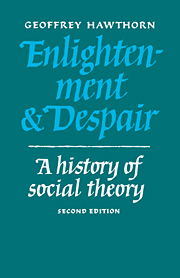Book contents
- Frontmatter
- Contents
- Preface
- Introduction
- 1 Enlightenment and doubt
- 2 History resolved by mind
- 3 History resolved by men
- 4 History resolved by laws I
- 5 History resolved by laws II
- 6 History resolved by laws III
- 7 History resolved by will
- 8 History doubted
- 9 History ignored
- 10 History unresolved
- Conclusion
- Bibliographies
- Index
3 - History resolved by men
Published online by Cambridge University Press: 18 September 2009
- Frontmatter
- Contents
- Preface
- Introduction
- 1 Enlightenment and doubt
- 2 History resolved by mind
- 3 History resolved by men
- 4 History resolved by laws I
- 5 History resolved by laws II
- 6 History resolved by laws III
- 7 History resolved by will
- 8 History doubted
- 9 History ignored
- 10 History unresolved
- Conclusion
- Bibliographies
- Index
Summary
hegel's immediate audience, like that of Kant and the other German philosophers at the end of the eighteenth century and the beginning of the nineteenth, consisted of university students. The contemporary German universities were relatively isolated from the rest of the society. Only Halle trained men for practical careers. For the rest, they were avenues of mobility to which the society offered no destination. They were thus a furnace of youthful bourgeois frustration. Up to the time of Hegel's death in Berlin in 1831, this frustration had expressed itself largely in the realm of ideas. Events changed this. After the rebellion in the July of 1830, liberal demands for a constitution and greater freedom of the press became more urgent, and the creation of the Zollverein heightened the contrast between increasing economic liberty and the continuing political repression. And repression, at least in the Prussian State, the State that Hegel had appeared to defend in The Philosophy of Right, did continue. The students began to feel the need to protest. It was into such an atmosphere that Karl Marx moved when he came to the University of Berlin in 1836.
This ‘black lad from Trier’, as a friend described him, who ‘rages without compare, as if ten thousand devils had him by the hair’ ignored the more formal parts of his education in favour of philosophy, and during an illness in 1837 ‘got to know Hegel from beginning to end’. He joined a post-graduate club of like-minded students in Berlin.
- Type
- Chapter
- Information
- Enlightenment and DespairA History of Social Theory, pp. 51 - 65Publisher: Cambridge University PressPrint publication year: 1987

